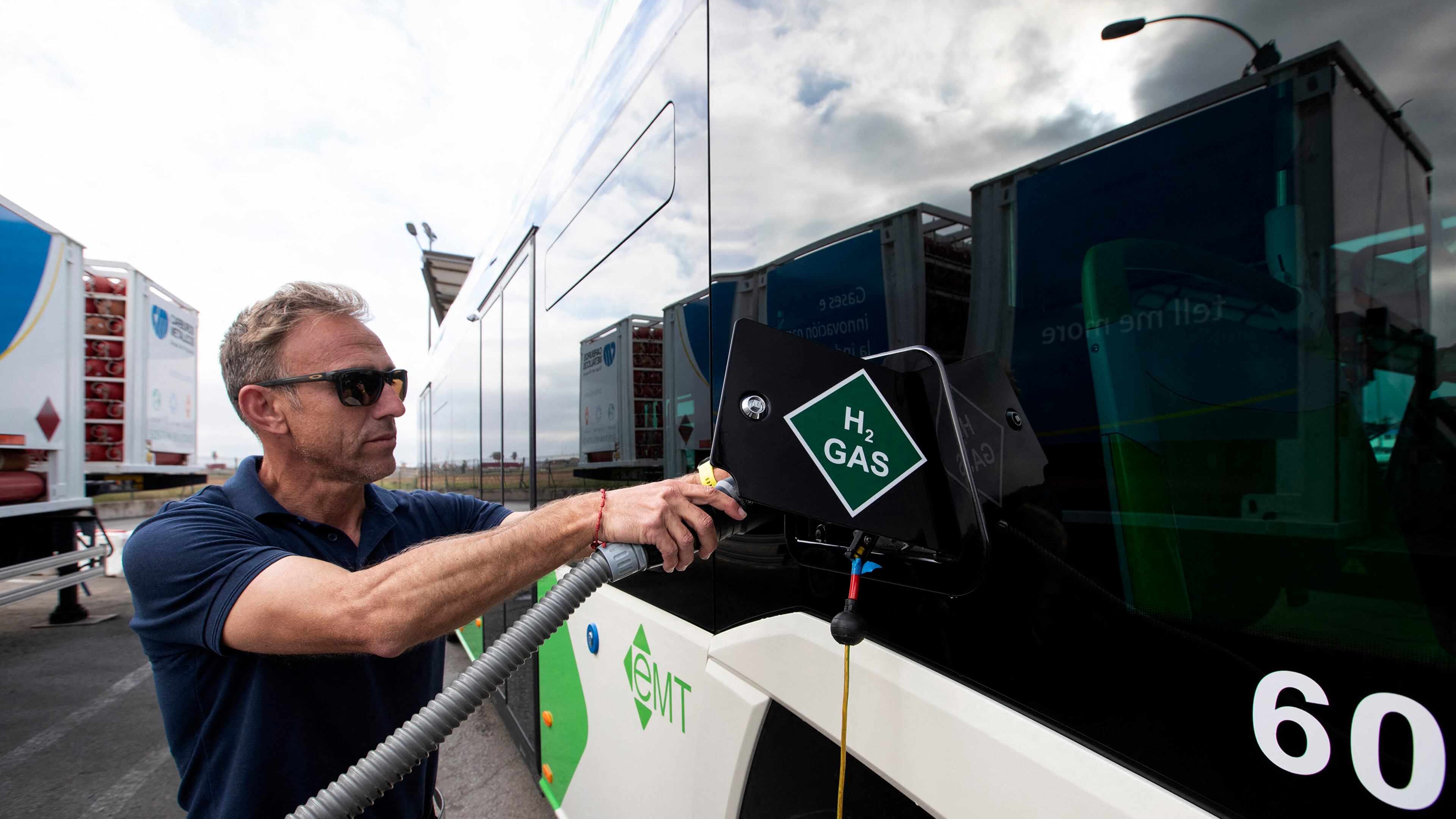Is a hydrogen highway in Georgia’s future? The state wants to find out

SAVANNAH --- Georgia officials are exploring the possibility of deploying hydrogen fueling stations across the state to power commercial vehicles, tractor-trailers and other large trucks. The heart of this hydrogen highway is potentially a 23-mile stretch of Interstate 16 near Savannah that connects Hyundai Motor Group’s now-under-construction electric vehicle plant and the Port of Savannah.
The Georgia Department of Transportation (GDOT) issued a request for information Monday seeking input from the private sector on how to bring a network of hydrogen fueling stations to fruition. GDOT is not hiring a firm to build any stations at this time but is instead seeking information on how to operate, develop and deliver such a network in a fast-emerging space.
Hyundai is one company with a huge Georgia presence with experience in hydrogen-powered trucking. The South Korean automaker is building a 3,000-acre manufacturing facility at a site along I-16 in Bryan County west of Savannah. Once the plant opens and launches production of EVs and EV batteries in 2025, Hyundai and its suppliers will move shipping containers of parts through the Savannah port — located five interstate exits east of the factory.
GPA officials estimate importing 40,000 to 50,000 containers a year initially and building to 100,000 annually by the time the facility reaches full production.
Hyundai manufactures hydrogen fuel cell big rigs, known as XCIENT, and uses them to transport materials in its operations in South Korea. Georgia officials observed the XCIENT trucks at work during visits to Hyundai in recent years, a memory shared by the leader of the Savannah Economic Development Authority when word of the state’s request for information on hydrogen fueling centers circulated Monday.
“They really like that technology,” Trip Tollison, the authority’s president and CEO, told his board of directors during the organization’s annual retreat. “We just lack the infrastructure right now.”
Hyundai did not immediately respond Monday to a request for comment.
Hydrogen has been hyped for years as an energy source that could help trucking and other hard-to-decarbonize parts of the global economy wean off fossil fuels. While it is the most abundant element in the universe, hydrogen rarely exists on its own on Earth.
To be used as a fuel, it needs to be isolated from other compounds that contain it. While trucks powered by hydrogen produce far fewer tailpipe emissions, reducing greenhouse gases that contribute to climate change, the environmental benefits depend on how the hydrogen is produced.
“Green” or “clean” hydrogen is produced using renewable energy, but over 90% of the hydrogen produced today is derived from fossil fuels. That process requires lots of energy and still results in emissions of carbon dioxide and methane, an ultra-potent greenhouse gas.
The cost of a hydrogen fueling network along I-16 or any other demonstration project is not immediately known. Funding sources to build such a system also are not clear, but a potential hydrogen fueling network could be geared towards winning at least some federal support.
The federal Department of Energy is also pouring money into advancing production and distribution. The agency has launched a “Hydrogen Shot” initiative, which is seeking to slash the cost of hydrogen by 80% in the next decade. The DOE has also released a roadmap for advancing the country’s hydrogen economy, which the administration projects could create 100,000 jobs.
A coalition of Georgia business, academic and political leaders, meanwhile, has been pitching Georgia to the federal government as a potential research center for the development of hydrogen as a viable energy source. The hub would be part of a network of research facilities that the Energy Department wants to create to explore using hydrogen for industrial, residential and transportation uses.
The technology remains in its infancy in the U.S. Gov. Brian Kemp said Georgia should join the ranks of early adopters like South Korea and Japan.
“I want to thank GDOT and our partners in the private sector who will ensure that when it comes to hydrogen energy, we will do as we have in so many other areas — lead,” Kemp said in a news release.
The potential endeavor would build upon the Peach State’s growing status as a leader in e-mobility. The state has attracted two multi-billion-dollar electric vehicle factories from Hyundai Motor Group and Rivian while also building a network of suppliers across the EV development pipeline.
In the U.S., hydrogen is predominantly used in the industrial sectors for fertilizer and methanol production, according to the release. The fuel’s prevalence is expected to vastly increase in the coming decades, with some projections showing that 14% of the U.S.’s energy demand could be fulfilled by hydrogen by 2050.
Through the RFI, state leaders want to consider the full range of potential hydrogen transportation uses and demands. GDOT said the state’s sea ports will be given “primary consideration” due to their impact on shipping and logistics across the state. The Savannah port also is located near Hyundai’s future $5.5-billion EV factory in Bryan County, which the company calls its “Metaplant.”
The RFI will be open for submissions for 30 days.
Editor’s note: This story had been updated to clarify the estimated number of shipping containers to be imported through the Port of Savannah each year by Hyundai Motor Group.
A note of disclosure
This coverage is supported by a partnership with 1Earth Fund, the Kendeda Fund and Journalism Funding Partners. You can learn more and support our climate reporting by donating at ajc.com/donate/climate/
More Stories
The Latest





